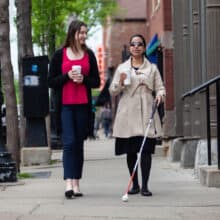Commentary: Teaching Future Professionals about Disability
March 1, 2016
Around 57 million people live with disabilities in the United States, making this the largest minority group in the country. We can only expect this number to grow as the baby boomer generation ages, and chances are that most – if not all – of us will at the very least encounter someone with a disability during our lifetime. Equally important is the fact that more Americans are pursuing higher education, and the variety of subject areas one can major in is very broad. Nevertheless, very few colleges emphasize the importance of teaching an important topic: how to interact with and respect people with disabilities.
A recent study from Oregon State University and Worcester State University found that most college psychology courses lack curriculum about people with disabilities. Researchers studied nearly 700 course descriptions from 98 colleges and universities with top ranking undergraduate psychology programs. While all 98 schools offered courses on psychiatric disability, only 8 offered instruction about physical disability. Furthermore, psychology courses tend to focus more on least common disabilities, rather than physical disabilities or chronic health conditions, which are more prevalent.
I can attest to the fact that none of the psychology courses I took in college covered physical disabilities whatsoever. To be honest, I did not expect this topic to be covered in any of the three psychology courses I took as an undergraduate. However, this research got me thinking of why it is important for more colleges to offer courses related to disabilities. Large institutions, such as the University of Illinois at Chicago, offer degrees in disability studies. I do not expect all colleges to offer these majors, but by offering introductory courses about disability or incorporating this subject area in psychology or other classes, both students and staff will benefit in the long run in many ways.
Most professionals will eventually encounter someone with a disability during their careers. An attorney, for example, might have a client who is blind or uses a wheelchair. Having basic knowledge about all types of disabilities can help professionals go a long way in interacting with and making people who have disabilities feel comfortable and at ease. I remember once being at the bank and in the process of opening a checking account. The employee who assisted me took the time to show me how to work the ATM, and offered to provide me my bank statements and other documents in Braille. Knowing that she was comfortable providing assistance and interacting with me made the whole process so much easier for both of us.
The United States is considered the most advanced nation in terms of disability rights. Still, more can be done to educate the public about disabilities. Colleges should take the initiative and teach our future workforce about this population. By teaching prospective professionals about how to interact with and assist people with all types of disabilities, a more friendly and inclusive environment will be created for everyone. Students will not only learn about the characteristics of disabilities, but will also receive important lessons about tolerance and respect toward others.





